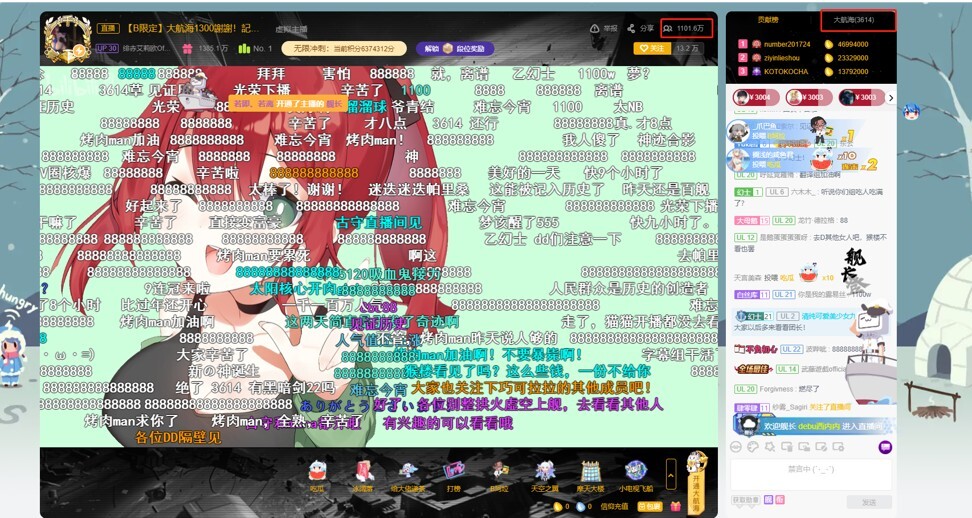
Bilibili: How a Chinese site dedicated to anime subculture grew up with its Gen Z users to become a mainstream success
- The Chinese video streaming site is trying to maintain its unconventional appeal and sense of community, as it embraces a wider audience
- Early users say Bilibili is losing its original charm, but some analysts say there are no obvious alternatives
It was the winter of 2012 and Kevin Lin was 13 years old. Like many children his age in China, he was obsessed with Japanese anime. And just like them, he got his fix on the internet.
His latest discovery was a scrappy anime streaming site named Bilibili.
Becoming a member of the platform was nothing like signing up for YouTube. First, Lin had to ace a 100-question quiz testing his knowledge on anime and the site’s rules. He failed a few times before finally passing with the help of Baidu, China’s Google equivalent.
Once he was in, he quickly discovered there was more to Bilibili than just cartoons. The site has one killer feature: bullet comments.

These are comments posted by viewers, but rather than relegating them to a separate section further down the page, Bilibili puts them right on top of the video. Bullet comments floated across whatever Lin was watching, sometimes to the point of covering the entire screen. It was a constant reminder that he was not watching alone, but part of a bigger community. And he has not been able to live without the feature ever since.
“If I was watching a Bilibili video without bullet comments, I would think something might be wrong: It’s not a complete Bilibili,” said Lin, now a 22-year-old college student living in the eastern coastal province of Zhejiang.
Once a niche platform reserved for anime nerds like Lin, Bilibili today has larger ambitions. Listed on Nasdaq since 2018, the Shanghai-based company hopes to capitalise on its growing mainstream appeal with a secondary listing in Hong Kong. It cleared a hearing by the city’s bourse operator on Thursday and will launch its IPO as soon as next week, Tencent News reported.
Since launching in 2009, Bilibili has grown into one of the most recognisable names in video streaming in China. It now boasts 54 million daily active users, who spend an average of around 75 minutes on the platform each day. Most of them are from what Bilibili calls Gen Z+, which the company defines as people who were born between 1985 and 2009, and many grew up with the site.
Over the years, Lin found that the platform has broadened to include more content than just anime. Videos created by users, known as “up zhu”, or uploaders, have become a force of their own. The topics span comics, games, memes and more, and viewers often find themselves being fed videos they did not even know existed.
“For me, Bilibili is different from [other video streaming sites like] Tencent Video or iQiyi,” said Lin. “I don’t know what Bilibili is going to recommend to me today. Maybe because of big data analysis, I feel like it knows what I like.”

By the fourth quarter last year, Bilibili said it had 1.9 million content creators who were contributing more than 5.9 million videos each month. Some long-time users, like Qu Chang, consider themselves part of a community made up of uploaders and their fans. She checks Bilibili daily to see if her favourite uploaders have posted new content.
Uploaders are constantly innovating their videos to keep viewers hooked, said the 25-year-old graphic designer who has used Bilibili for seven years.
“Take gaming videos, for example. They used to [simply] record a session and upload it when they finished the game. Now they use these videos as a medium to express their own ideas,” she said.
Bilibili actively cultivates what it calls professional uploaders, similar to YouTube influencers.
One of them is Hu Dahan, who specialises in Cantonese-speaking videos in which he talks about his reactions to Chinese variety shows with friends. Since he uploaded his first video in 2018, his channel Yuenan Youhuaer, meaning “Cantonese man has something to say”, has attracted more than 280,000 followers and drew over 72 million total views.
Hu said he was drawn to Bilibili by its receptive audience.
“I was not a Bilibili user until I was searching for the right platform to post my videos … and Bilibili struck me as a young, inclusive community that would resonate with my content,” said the video producer who moonlights as a Brazilian jiu-jitsu coach.
This year, Hu signed on to become an exclusive content creator at the invitation of Bilibili. As part of the deal, Hu said the company would communicate with him on his pitches and share daily insights on trending internet topics. “The platform is very friendly to content creators, especially grass-roots uploaders like us,” he said.

Experts say Bilibili’s efforts in grooming uploaders is part of its core strategy.
The goal is to retain loyal users by creating “a close emotional bond” and “building a unique community atmosphere”, wrote Everbright Securities analyst Fu Tianzi in a research note.
A recent foray into short videos has also helped Bilibili fend off challenges from growing rivals like Douyin, TikTok’s sibling app in China, according to Shawn Yang, Shenzhen-based managing director of Blue Lotus Capital Advisors. Meanwhile, strengthened Bilibili original content has helped the site attract more long-form video viewers.
Despite its subcultural roots, growth has always been a goal of Bilibili, according to company CEO Chen Rui.
“There are only two types of products on the internet: the ones that excelled and the ones that died,” he said in an interview with Chinese media outlet LatePost in 2019. “The industry that Bilibili is involved in is too brutal. In the long run, content platforms with a market size of less than US$10 billion in China will be eliminated … I’m not even talking about a goal. It’s just that if I cannot reach that line, I will die.”
Still, the platform, currently valued at over US$36 billion, is only at an early stage of monetising its users.
Although Bilibili’s share price has increased around tenfold since going public in the US, it has been in the red for 13 consecutive quarters. Net losses widened from 1.3 billion yuan (US$200.8 million) in 2019 to 3.1 billion yuan in 2020. Operating expenses increased 123 per cent year on year to more than 6 billion yuan.

Despite being known as a video site, Bilibili makes the most of its money from mobile games, which made up 40 per cent of its revenue last year. Value-added video services (VAS), including live streaming and premium subscriptions, contributed 30 per cent. In the fourth quarter of 2020, however, VAS surpassed mobile games as the biggest sales generator for Bilibili.
To drive up video revenue, paid subscriptions have become a key part of Bilibili’s strategy. The platform rolled out a premium membership programme in 2016, which had 14.5 million members in 2020, up 91 per cent from a year ago.
Not everyone has been a fan of the subscription model, though.
Bilibili CEO Chen once said that the introduction of premium memberships set off “an intense panic in the community”, which he did not foresee.
“At first we thought it would be fine because we didn’t diminish the user experience of non-[premium] members,” he said in his 2019 interview with LatePost. “But those users were worried that [we] have gone bad and don’t love them any more.”
Some early users echoed the sentiment that Bilibili has strayed too far from its roots in its bid to go mainstream.
Yoyo Guan, a 30-year-old banking professional in Guangzhou, joined Bilibili in 2012. She used to spend hours watching anime music videos and other anime, comics and games (ACG) content on the site.
Today, however, Bilibili is no longer part of her daily routine after she noticed that the site deleted some pirated videos and controversial content deemed inappropriate.
“In the past Bilibili [content] was unapologetically outspoken and diverse, with all sorts of bizarre subcultures – whether it was taboo relationships or even violence, ” Guan said. “It’s not that [users] had a filthy mouth; they were just bold enough to admit and tolerate the existence of unorthodox hobbies.”

Yang from Blue Lotus Capital Advisors, however, said he does not expect an exodus of users from Bilibili. “There isn’t a substitute for Bilibili for its core users now, and the entry of news users is not going to disturb early users who can keep watching the videos they like.”
Some users said they still find Bilibili to be a more diverse platform than competitors.
Some early users said they have accepted that the original Bilibili is not coming back.
Frank Lin, a postgraduate student living in Shanghai, said he used to watch anime on Bilibili, but he has been using the platform less and less.
“Bilibili is not the Bilibili it used to be, and I’m not a teenage boy any more,” he said.
“But I know companies need to survive.”


